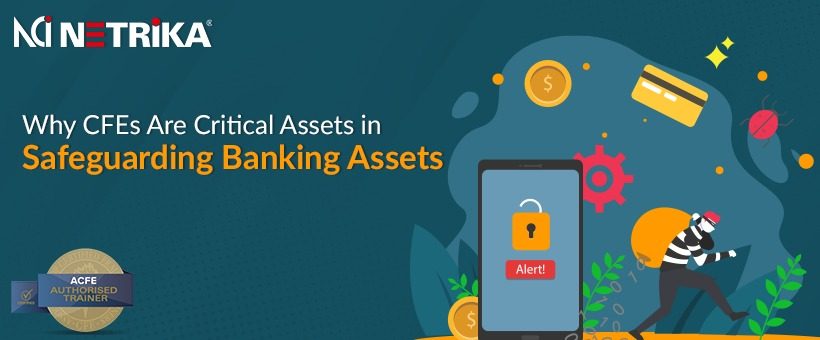News & Events
Why CFEs Are Critical Assets in Safeguarding Banking Assets
- June 14, 2024
- Posted by: marketing@netrika.com
- Category: Blogs

Certified Fraud Examiner (CFE)
In the banking sector asset protection helps to ensure that financial institutions are stable and reliable. As financial crimes become more complicated, banks need experts who can handle the complexities involved in the detection and prevention of fraud. CFEs are Certified Fraud Examiners who are uniquely qualified professionals and play a critical role in protecting banking assets.Read more.
CFEs: The Critical Assets in Safeguarding Banking Assets
- CFEs are qualified to spot red flags in internal controls and financial statements, which can stop fraud before it starts and save your business thousands of dollars. CFEs may provide a great deal of experience in creating and implementing strong internal controls to protect the bank’s assets, confidential data, and good name. When fraud is committed, a CFE can help banks navigate the court system, settlement talks, and the involvement of police enforcement.
- The main role of a certified fraud examiner is identifying, preventing, and/or discouraging bank fraud. A CFE may be employed by the bank as an auditor or fraud investigator, or they may be contacted to ascertain whether there is sufficient evidence to suspect fraud has occurred or may be occurring in a firm. In reaction to ongoing litigation or anticipation of impending litigation, a CFE may also be retained. Among the many tasks performed by a certified fraud examiner are the analysis of financial records, internal control audits, witness interviews and statement taking, evidence collection and evaluation, report writing, courtroom testimony, and much more.
- CFEs utilize the field of behavioral analytics, which is based on people exhibiting recurring patterns of behavior over time. Any departures from these well-established patterns could be a sign of dishonest or malicious activity. To spot fraudulent activity and prevent it from happening again, certified fraud examiners keep track of the time of day, location, frequency of transactions, and spending patterns.
- Certified Fraud Examiners leverage machine learning and artificial learning to enhance the efficacy of the previously described fraud detection technologies. By merging training data from millions of legitimate and fraudulent transactions, machine learning can enhance fraud detection systems. Artificial intelligence, in the meantime, can be used to improve automated fraud response processes’ accuracy.
CFEs have the knowledge, alertness, and farsightedness to keep the assets of the banking sector safe from fraudsters and maintain financial soundness. This is what makes them valuable for banking institutions in terms of preventing financial crime as they detect it proactively while being ethical and regulatory compliance-orientated. CFEs will continue to have an important role in securing stability in financial institutions as banks face new challenges.

